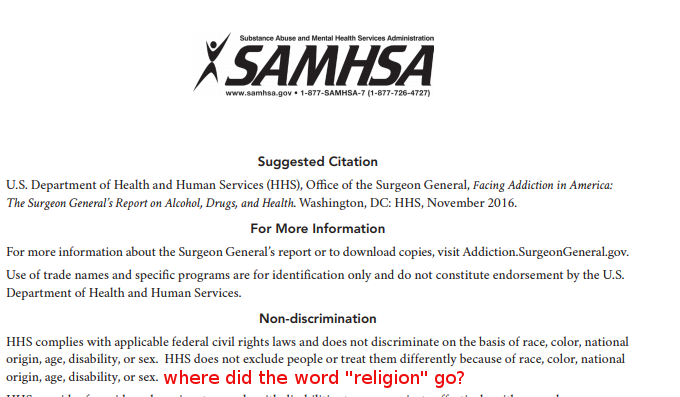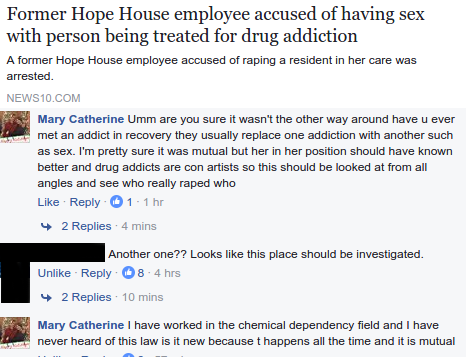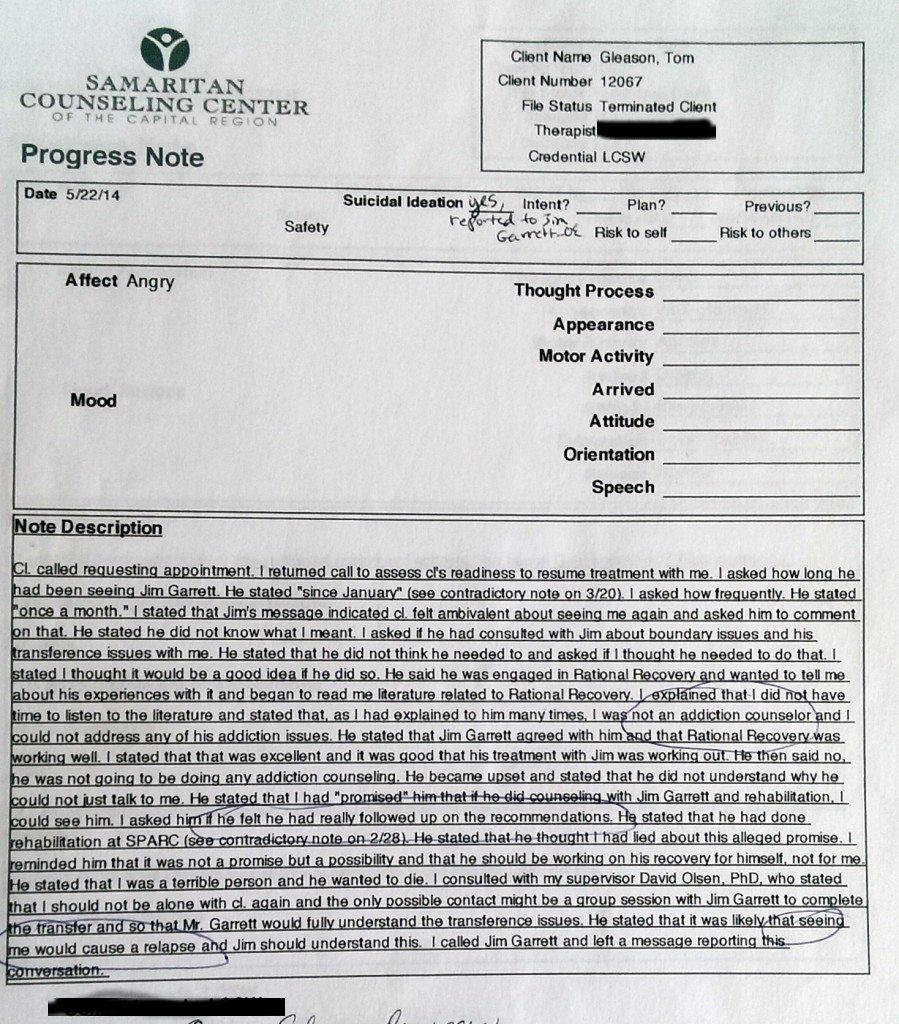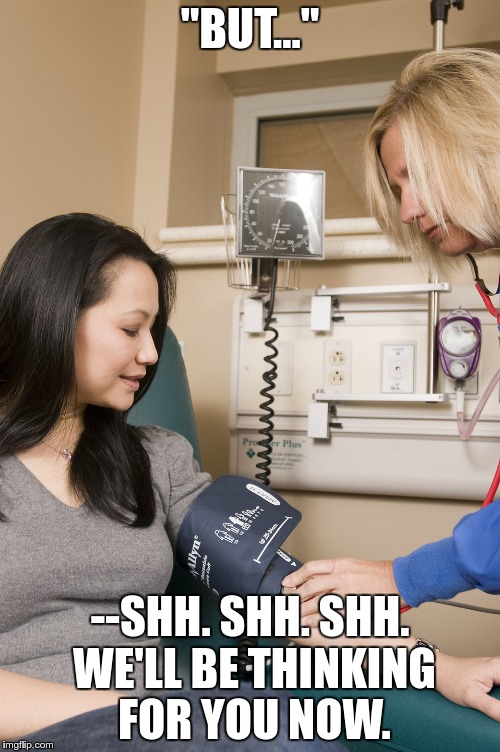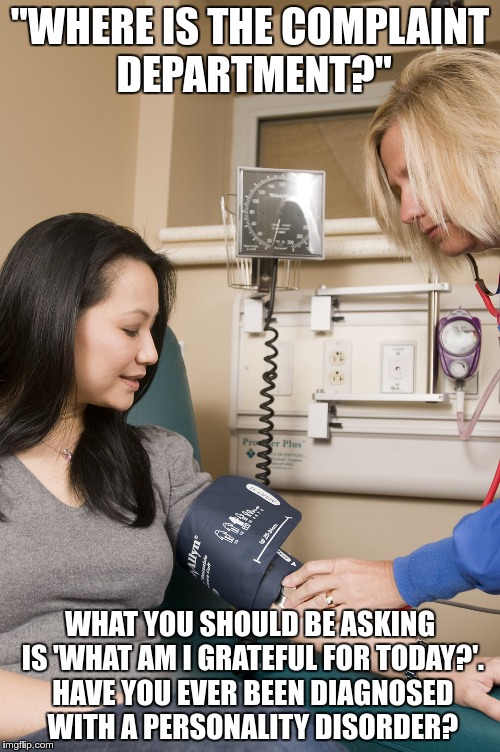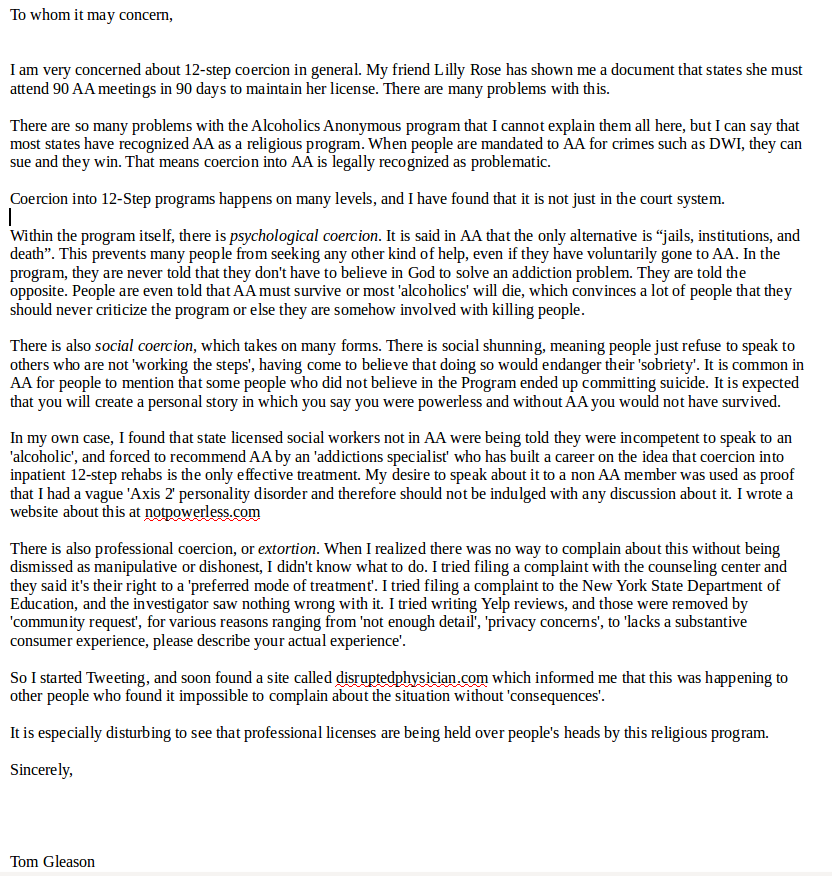Here is the former Drug Czar Robert DuPont. At 6:30 you can hear about the ‘between the eyes repeatedly with a 2×4′ method of getting professionals into ‘Recovery’, which got Talbott sued (successfully) for false imprisonment and medical malpractice in 1999. DuPont was also a consultant for the Straight, Inc. program that was shut down by multiple lawsuits alleging abuse and malpractice, several of which were successful. He is part of a long history of this abusive industry.
Category Archives: Destructive Cults
The ARISE Intervention by Judith Landau – My review
The ARISE method misrepresents itself. It IS about coercion. It is an extended Johnson intervention that ‘gradually escalates’ with ‘serious consequences’ for not entering 12-step treatment. The contracts in the book Invitational Intervention involve immediate inpatient rehab if any drug is used, mandatory drug tests, and ‘natural consequences’ (which are not actually natural consequences, because it is not natural to face consequences for not wanting intensive 12-step facilitation.
Here are articles I’ve written on my experience of the ARISE intervention, which involved using my family and trusted therapists to continually re-leverage me into meetings and treatment that I was already very familiar with and had rejected.
Here is something interesting: AA and rehab often say that you have to WANT it for it to work. The ARISE method is, like EAPs, PHPs and Drug Courts, coercive. If you read the book, you will find that they are lying when they say it is not coercive, because the method actually says that self-referrals don’t work — that coercion is part of the process. Also, their success rates (the 83% quoted) involve measuring success at getting people INTO treatment, a fact that is easily lost on people who assume the treatment will actually be helpful. Also note that they will try to bring your whole family into the 12-step cult and treatment because it’s a so-called ‘family disease’.
Summary: false advertisement, easily verified bait-and-switch. It is more a system for addiction specialists to make money off of rehab referrals.
New York State Education Department Investigator Admits Policy of Willful Negligence
Investigator Patrick Flynn told me on the phone when he was closing out my case that 1. My therapist denied everything so it was “he said she said” and 2. ‘We don’t look into the AA thing’. So, after three attempts at getting New York State to acknowledge a very serious problem with two-hatting therapists over the course of two years, this has always been and is still their official position, regardless of how it is clearly willful negligence.
New York State should, of course, acknowledge facts like:
– Treatment coercion is illegal. When networks of people are coached to impose ‘consequences’ for not entering treatment, it’s still coercion even if you say it’s not. It may even be a form of insurance fraud.
– Religious indoctrination into AA is a First Amendment violation, as well as a bad treatment for most conditions. It is ineffective and should not be protected from malpractice and fraud complaints.
– The 12-step treatment industry is psychologically abusive and extortionist in its approach. This is verifiable and not up for debate. ‘Treatment’ is life-and-death necessity until it fails or it’s questioned, and then suddenly “AA isn’t treatment”.
Finally, other abuses are easily hidden under the guise of ‘help’ in a 12-step organization, and also often arise out of the confusion that 12-step programs create. It is not necessary to lie to your clients, seduce them, or punish them to ‘motivate change’. The ‘unforced forces’ of better arguments have their own power.
In my opinion, it should be standard practice for New York State Education Department to inform therapists accused of 12-step coercion that this is not acceptable for a variety of reasons and they are being warned and will face consequences to their license status if new complaints arise. It’s the f*cking EDUCATION department; they need to be setting some standards for basic knowledge about treatment options.
AA Service Manual Page 69
Sounds like some kind of mafia talk (for such a ‘voluntary’, ‘live and let live’ organization!):
“Privately, however, we can inform Tradition-violators that they are out of order. When they persist, we can follow up by using such other resources of persuasion as we may have, and these are often considerable.”
“This combination of counter forces can be very discouraging to violators or would-be violators. Under these conditions they soon find their deviations to be unprofitable and unwise.”
“Feeling the weight of all these forces, certain members who run counter to AAs Traditions sometimes say that they are being censored or punished and that they are therefore being governed….Some deviators have suffered rather severe personal criticism from individual AA members, and this is to be deplored…It can be said in all fairness that the difficulties of those who contravene the Traditions are chiefly troubles of their own making.”
KIDS (formerly Straight Inc) Documentary
After Two and a Half years, this complaint is disregarded by New York State
The last complaint to New York State Department of Education Office of Professions (the licensing board). The investigator told me that he called my therapist and she just denied everything, so he said it’s a ‘he said she said’ thing. He also told me ‘We don’t look into the AA thing”.
SilverSamaritan (PDF)
I am writing in support of my brother (PDF 2nd Letter)
So, there are two letters explaining just how much has gone ignored by Samaritan Counseling, Samaritan Institute, New York State Licensing Board (which is staffed by the Clinical Director of Samaritan Counseling at the time), and the Justice Center. For anybody who thinks this is an isolated incident, like I initially thought it must be, please consider the following comments found on a FaceBook post about two Hope House employees getting arrested within the same week for having sex with rehab clients:
The pattern is clear and should not be ignored. It is a product of 12-step culture. Invoking high-school-level “addicts are con artists” or “only sometimes honest with themselves and others” after having some fun with them doesn’t fly when you’re supposed to be a treatment provider. People have basic human rights and deserve to be taken seriously, and Medicaid and insurance shouldn’t be paying for the “Spiritual Recovery” Dating Game.
The New Recovery Advocacy Movement
There are a couple of recent documentaries on the culture of Alcoholics Anonymous (see The 13th Step the film which documents systemic psychologically damaging dynamics), and the $35 billion dollar business arm called the ‘rehab’ industry (thebusinessofrecovery.com which documents deceptive business practices). Those films have only started being distributed in the last year, and not widely. A book called The Sober Truth: Debunking the Bad Science behind AA and the Rehab Industry by Lance Dodes also takes a good critical look at evidence.
While these are newer attempts to inform the public about real problems with AA, complaints are not new and have been increasing. Rehabilitation programs like Straight, Inc. in the eighties were controversial and faced lawsuits for false imprisonment and abusive practices. In 1999 a doctor won a case against a rehab program for false imprisonment, fraud and medical malpractice. In 2001 the Department of Justice issued a statement that any use of DoJ funds to indoctrinate religion (specifically 12-step programs) was a violation of the 1st Amendment, yet my own investigation found that state programs are still very actively involved in spreading the AA message.
Several cases have set precedent that it is illegal for judges to order people to AA, and yet they still do it. Many doctors who have heard about getting help with an addiction problem entered into Physicians’ Health Programs only to find that they will lose their licenses if they don’t attend a 90-day rehab (at their own expense), 3 AA meetings a week (for years) or try to dispute mandatory, random drug tests (paid for by them). These programs establish behavioral contracts with the license as leverage and any violation adds YEARS to the contract and severe consequences (such as loss of license, with no ability to dispute or argue). (see disruptedphysician.com ) Doctors, nurses, pilots who have lost their livelihood, when they don’t kill themselves, sometimes realize they have nothing to lose anymore and decide to speak out. Many of them straightforwardly identify the system as a racket, unfair, and ‘kafkaesque’.
Sober living environments are presented as a treatment option, and often turn out to be not much more than slumlording as a non-profit — no actual treatment, no medical oversight, but maybe a pee testing scheme to make money for each ‘head’ from insurance companies. These places are often even considered ‘rehabs’ or halfway houses but often are nothing but houses with AA members in them.
AA through its pamphlets teaches members how to promote these professional systems and rehabs through the media, and yet denies any involvement or responsibility. What is called the New Recovery Advocacy Movement is the cultural cooption of AA alternatives (like MM and SMART) and tries to gather them all under the umbrella of ‘spiritual recovery’ and the rehab and sober living industry. One example of this is a movie called The Anonymous People which found some data about 20 million people in America being considered ‘in recovery’ because they had a substance use issue and resolved it, and used that to enhance the image of ‘Recovery Culture. In reality there are only about 2 million people in AA and the majority recover without treatment or religious conversion, and there is even evidence that treatment is counterproductive. I could go on and on.
This is all to say that someone approaching AA with a methodological atheist standpoint will be tempted to reinterpret AA in secular terms assuming that the interpretation will explain ‘how it works’, when it actually doesn’t (as treatment). The assumption that it works in the first place is only an assumption. Even the concept of needing a support group is mostly an invention of AA, and prematurely assumed to be an important aspect of any secular approach.
A closer look at evidence, even the positive evidence such as experts claiming it works or that “they don’t force people into AA anymore” doesn’t stand up to scrutiny, and these dynamics (such as the fact that critics may never be allowed to BE professionals in the recovery industry and may in fact not want a piece of it) does more to explain how racketeering, censorship and misinformation works than how a treatment for ‘alcoholism’ works.
What is 12-step Coercion?
Allow me to walk the reader through why this call was so upsetting to me. I think it is a good case study in games ‘Addiction Specialists’ play.
“Cl called requesting appointment. I returned call to assess cl’s readiness to resume treatment with me. I asked how long he had been seeing Jim Garrett”
How is the length of my time talking to a 12-step interventionist in any way related to my ‘readiness’ to have a therapy session that I am asking for?
“He stated ‘since January’ (see contradictory note on 3/20).”
On 3/20 I had quit sessions with the ‘addiction specialist’, because I had just received a letter from Samaritan Counseling suggesting that I was required to see James Garrett for an indefinite period of time before I might possibly be able to resume ‘normal people therapy’. I had been in and out of rehabs, fighting for my ‘right’ to be in them, on his recommendation for almost a year. Records show that he told her I was not following ‘my side of the contract’ after being terminated from expensive and ineffective outpatient rehab for complaining about the cost of drug tests and Step One worksheets.
“I asked how frequently. He stated ‘once a month'”.
Yes, I was doing as few addiction counseling sessions as possible because they were $110/pop and I was only doing it so I could get back into therapy. I had already spent several thousands of dollars on this that insurance was not covering.
“I stated that Jim’s message indicated cl. felt ambivalent about seeing me again and asked him to comment on that. He stated he did not know what I meant.”
I was a bit ambivalent about asking for the appointment, because I suspected that she might tell me I didn’t do enough rehab correctly (again). I also suspected that James Garrett would be discouraging her from meeting with me (which turned out to be true). I was not, however, ambivalent about seeing her again; I wanted very much to tell her about my rehab experience, and hoped since she recommended it, she might care about how it went. More importantly, his use of the word ‘ambivalent’ implied that I was ‘addicted to therapy’ and probably needed therapy with him for that.
“I asked if he had consulted with Jim about boundary issues and his transference issues with me. He stated that he did not think he needed to and asked if I thought he needed to do that. I stated it would be a good idea if he did so.”
First of all, I don’t see how refusing to speak to someone unless they pay a lot of money indefinitely for treatment that isn’t helping, or joining a religious cult, is a healthy professional boundary. (A doctor just got evaluated and suspended for requiring everybody to say ‘I’m wonderfully hungry’ before he would speak to them. This goes above and beyond the ridiculousness of that) It’s certainly not my own ‘boundary issue’. If I as a client say “I don’t want anything to do with this AA addiction treatment anymore”, that’s a reasonable boundary that should be respected, and it is most certainly NOT a ‘boundary issue’ that I need to go back to 12-step treatment to resolve. WTF.
As far as the ‘transference issues’, transference is described as a normal phenomenon. A client feels a connection with a therapist after many hours of soul-baring, and feels a range of emotions as part of the therapy process. At this time, I was feeling abandoned and betrayed (because in fact in many ways my own interests WERE being abandoned and betrayed), as well as holding on to the hope that she would be my witness in this process (which was in some sense agreed upon in January). Remember, I had just waited two more months for the opportunity to ask for an appointment, and spent another $220 dollars for ‘addiction treatment’ because I was told I’d get that appointment (by both her and James Garrett). I did not need another $110 12-step lesson in ‘understanding that I can’t get my way all the time’ WITH the very people jerking me around for money and then smirking when I get a case of the ‘fuckits’.
“He said he was engaged in Rational Recovery and wanted to tell me about his experiences with it and began to read me literature related to Rational Recovery. I explained that I did not have time to listen to the literature and stated that, as I had explained to him many times, I was not an addiction counselor and I could not address any of his addiction issues.”
It’s ironic that she didn’t have time to listen to me here, since she had the time to push me into 12-step programs repeatedly for about a year. What I was trying to explain to her about Rational Recovery was that ‘choosing Rational Recovery’ was a decision to avoid all “addiction treatment” because it is almost invariably 12-step indoctrination. Even the addiction specialist did not seem to understand this point and told me I still needed meetings, to which I told him that RR cancelled all meetings 15 years ago because you DON’T need meetings or treatment to stop drinking. He said there were a lot of politics involved. Apparently he hadn’t been paying attention to those politics for at least 15 years, then. Only 8 years before this, he had written a book about using leverage and consequences to coerce people into inpatient 12-step ‘treatment’. I thought it was especially ironic that he was using ‘lack of support in my life’ as a reason for needing meetings, while at the same time basically discouraging my ‘non-addictions’ therapist from supporting me.
“He stated that Jim Garrett agreed with him and that Rational Recovery was working well. I stated that that was excellent and it was good that his treatment with Jim was working out. He then said no, he was not going to be doing any addiction counseling.”
I did not want her to think that ‘treatment with Jim’ was working out well. I wanted her to understand that my decision to LEAVE ‘addiction treatment’ was valid.
“He became upset and stated that he did not understand why he could not just talk to me. He stated that I had ‘promised’ him that if he did counseling with Jim Garrett and rehabilitation, I could see him.. I asked if he felt he had really followed up on the recommendations. He stated that he had done rehabilitation at SPARC (see contradictory note on 2/28). He stated that he thought I had lied about this alleged promise. I reminded him that it was not a promise by a possibility and that he should be working on his recovery for himself, not for me.”
Clearly here she was grabbing at the very reasons my ‘Rational Recovery’ argument was supposed to eliminate. Of course, she didn’t bother to listen to that argument, and Jim Garrett certainly didn’t explain it to her, so how could she have known that saying I didn’t do rehab correctly or enough was no longer an acceptable reason to call me incompetent for normal people therapy? She said ‘You may THINK I promised you something,’ as if I completely imagined the ‘contract’ she supposedly discussed with Jim about 2 months monitoring by Jim before I could meet with her, which is written twice in his notes. I almost had the feeling that this conversation was coached, perhaps by David Olsen who seems to be particularly interested in tough-love ‘boundaries’ that serve the purpose of ‘pastoral excellence’, especially since several times in those last five months she seemed to agree to a meeting and then be dissuaded by the addiction specialist or her supervisor. Records show that David Olsen, her supervisor, intended me to be in treatment for 6-8 months before discussing anything, but I had never heard this. The fact that she wrote ‘I could see HIM’, could indicate that she may have felt she was not being allowed to do her job. When she told me to work on recovery for myself, not for me, it could have suggested that she knew I was set up for failure if I kept trying to get back into therapy.
“He stated that I was a terrible person and he wanted to die.”
I started crying and then hung up. The whole conversation made me feel like a liar, a failure, and I was just in disbelief at how ridiculous it all was. It gets even more ridiculous after she consulted David Olsen:
“I consulted with my supervisor David Olsen, PhD who state that I should not be alone with cl. again”
I’m not sure how begging for someone to listen to me to the point of becoming suicidal suddenly gets flipped into me being some kind of homicidal maniac.
“and the only possible contact might be a group session with Jim Garrett to complete the transfer and so that Mr. Garrett would fully understand the transference issues”
Again ‘the only possible contact’ suggests she might not have agreed with the whole idea of these ‘clear boundaries’ that James Garrett and David Olsen seemed to be promoting to keep me isolated in treatment. By the way, this session never happened, because I then sent a letter of complaint and got banned from all communications with Samaritan by David Olsen and Jenness Clairmont the Clinical Director, and James Garrett told her to keep clear boundaries because of my ‘Axis 2 (harassing, fixated)’ behavior.
“He stated it was likely that seeing me would cause a relapse and Jim should understand this.”
OK, this is where it just becomes completely absurd and idiotic. How could ‘recovery’ be a state of not being able to speak to a therapist without relapsing? That doesn’t sound like recovery to me in any way. And really, if your therapists are that horrible that the mere sight of them causes relapses, you should either fire them or consider that you might be a paranoid control freak.
I like to stick to the records as much as possible, because that means I’m arguing with their ‘official’ position on it, but I should also mention I got upset because she said [verbatim] “I will never support your decision to use Rational Recovery”. I demanded an explanation as to why she would ‘never support my decision’ to stop drinking and stop going to meetings and treatment that were expensive and confusing. She also said “It wouldn’t be therapeutic” to meet with me, which were the exact words the girl at the rehab used when I wanted to discuss the Step One worksheet, then asked her to put me in contact with my therapist so I could talk to someone else about it then.
On top of that, after five months of jumping through hoops, not being considered ‘better’ or insightful in any way made me want to die, and I actually checked into a psychiatric hospital, which would not have happened if I felt anyone at Samaritan was really listening to me. If you want to call that a mental health relapse, that would be one right there, and “modicum of perceived support or concern from another human being may have prevented it”.
Hospitals and Institutions Committees
Hospitals and Institutions committees organize Alcoholics Anonymous proselytizing in hospitals, mental health facilities, and jails. I think hospitals shouldn’t allow this. Informed consent is a big part of medical law, and they wouldn’t want to get sued, would they? Especially in mental health institutions, this is disturbing.
Stateside
“I was kind of upset when I found out…”
“How are people not getting this information? He didn’t even know what SMART Recovery was… I literally had a counselor there tell me that if I didn’t get involved in NA I would probably die. That was a counselor, someone with their college degree in the field.”
This was my experience too (being shocked that nobody seemed to be aware that rejecting AA is a real option), except I delved more deeply into how and why this happens, which is the focus of this blog.
Michigan Radio Segment Highlights Secular Alternatives to Alcoholics Anonymous
